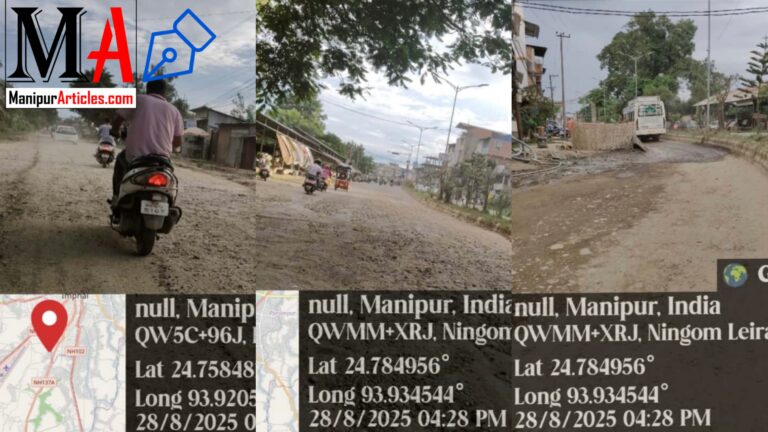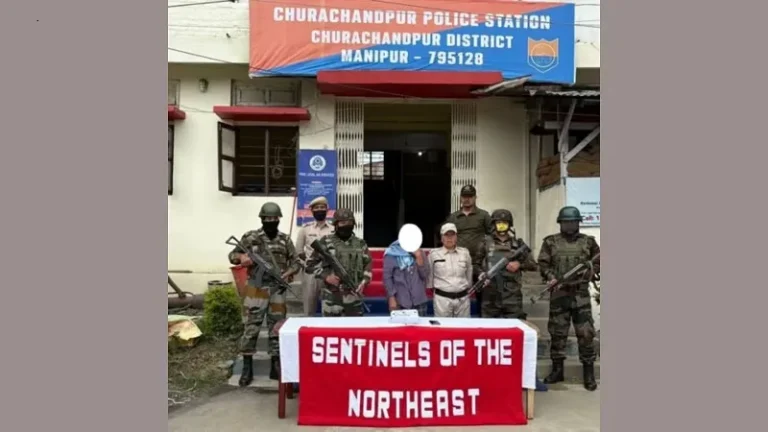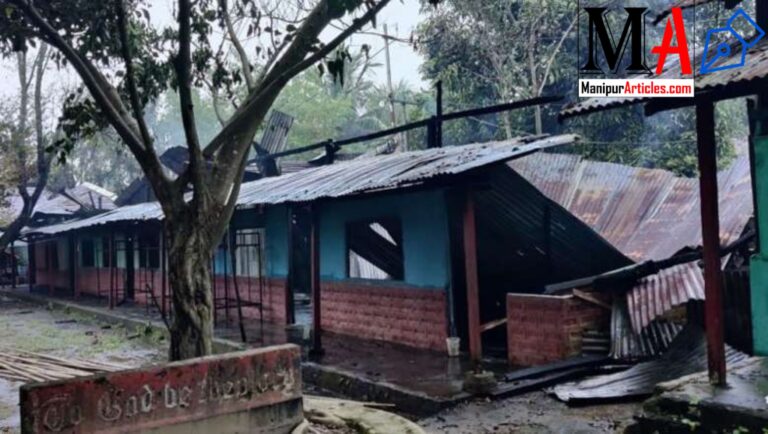Manipur Security Forces Uncover Large Weapons Cache Near Myanmar Border
Summary
In a recent joint operation along the Manipur-Myanmar border, security forces discovered a significant weapons cache in the Samukom area, inhabited mainly by the Kuki-Zo community. This high-stakes mission, led by the Assam Rifles, ITBP, and Manipur Police, targeted an illegal militant camp. They recovered multiple firearms, explosives, and communication devices, which have now been handed over to local authorities for further investigation.
Detailed Article
Introduction
Manipur has recently been at the forefront of security operations as tensions escalate along the Indo-Myanmar border. In a joint initiative, a team of Assam Rifles, Indo-Tibetan Border Police (ITBP), and Manipur Police successfully conducted a critical combing operation, leading to the discovery of an extensive cache of firearms and explosives in the Samukom area of Tengnoupal District. These operations underscore the persistent security challenges faced by border states in maintaining stability amidst various insurgent threats.
The Growing Security Concerns in Manipur
Manipur’s position on the map makes it a hotspot for conflict and crime. Located at the northeast edge of India, it borders Myanmar, a country with its own complex political landscape. This geographical context has turned Manipur into a key site for illegal arms smuggling and militant activities, pushing state forces to increase vigilance and implement stringent control measures in these sensitive regions.
Strategic Location and its Challenges
Being adjacent to Myanmar, Manipur’s remote border areas are often beyond easy access for law enforcement, creating a haven for illegal camps. Notably, the region’s proximity to active militant zones has complicated peace-keeping efforts, forcing local authorities to work closely with central forces. For the people of Manipur, this scenario has not only led to security risks but also disrupted daily life due to recurrent militant activities.
Operation in Samukom: What Happened?
The recent mission took place in Samukom, a village within Tengnoupal district close to the Myanmar border. This area, predominantly inhabited by the Kuki-Zo community, has been under surveillance due to increased militant movements and reported illegal activities. The mission followed specific intelligence regarding an illegal camp harboring militants and weaponry.
Conducting the Operation
Security forces meticulously executed a cordon and search operation, intending to neutralize potential threats and recover illegal arms. The collaborative effort involved combing through difficult terrains and carefully monitoring camp movements. Such operations require precision and patience, as militant forces often resort to disguising their armories or using sophisticated hiding tactics to elude discovery.
Weapons Cache: A Look at the Recovered Arms
In a remarkable discovery, the operation yielded an array of weapons, ammunition, and communication devices that would otherwise have posed a substantial threat. The recovered items included:
- Two pistols and ammunition: Small firearms such as pistols are commonly used in insurgent attacks, providing ease of movement and concealment.
- IEDs and high explosives: The cache held nine Improvised Explosive Devices (IEDs), eight high-explosive pompi grenades, and 36 hand grenades. The presence of these explosives indicates a possible plan for coordinated attacks or ambushes.
- Communication Devices: Two walkie-talkies were also recovered, suggesting a communication system in place for coordinating between groups or tracking enemy movements.
Implications for Border Security in Manipur
This significant find highlights an urgent issue for India’s security apparatus. Border states like Manipur are increasingly becoming ground zero for illegal arms trafficking, driven by insurgent groups aiming to destabilize the region. This seizure points to the challenges that lie ahead and reinforces the importance of heightened surveillance in these border areas.
Impact on Local Communities
For residents near the border, such as those in Samukom, these operations often bring mixed reactions. While they underscore government commitment to curbing militancy, they also disrupt normal life. The presence of insurgents in proximity to local communities places civilians in a difficult position, as they face pressure from militant groups as well as increased scrutiny by security forces.
Cooperation and Future Strategies
The recent cache recovery exemplifies successful inter-agency collaboration between state and central forces. With the insurgent threat likely to persist, future strategies may involve increased intelligence sharing, infrastructure development along border zones, and more joint operations. Such initiatives are vital in dismantling networks that exploit these border areas.
Role of Assam Rifles and ITBP
The Assam Rifles, India’s oldest paramilitary force, has been pivotal in securing the northeastern frontier, while ITBP plays a critical role in mountainous terrains. Their continued presence and expertise make them well-suited to counter-insurgency efforts in Manipur.
Conclusion
This recovery is a significant victory in the ongoing efforts to stabilize Manipur. As insurgent groups continue to leverage the geographical complexities of India’s northeastern borders, such security operations will remain crucial. For the residents of Manipur, every operation and discovery of illegal weapon caches is a step closer to a more peaceful existence.
FAQs
- What types of weapons were discovered in this operation?
- The security forces recovered pistols, IEDs, high explosives, grenades, and communication devices from the militant camp.
- Why is Manipur a hotspot for militant activities?
- Due to its strategic location bordering Myanmar, Manipur experiences frequent militant infiltration and smuggling activities.
- How does this operation impact the local communities in border areas?
- While it enhances security, it can disrupt daily life for locals due to increased surveillance and occasional conflicts.
- Who conducted the recent operation?
- The Assam Rifles, ITBP, and Manipur Police collaboratively carried out this operation based on specific intelligence.
- What future steps are planned to enhance border security?
- Increased intelligence sharing, frequent joint operations, and infrastructural developments are likely steps for enhancing security in the region.





